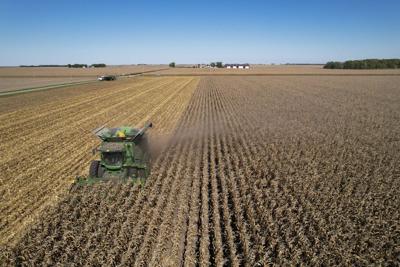DECATUR, Ill. (WAND) — On Tuesday, the United States imposed 25% tariffs on imports from Canada and Mexico, along with 20% tariffs on imports from China.

FILE - A combine harvests corn, Tuesday, Oct. 10, 2023, at a farm near Allerton, Ill. (AP Photo/Joshua A. Bickel)
The Trump administration suggested that inflation may not rise as sharply as some economists predict, arguing that tariffs could encourage foreign companies to establish factories in the U.S.
In response, China announced retaliatory tariffs of up to 15% on products such as chicken, wheat, corn, and cotton, as well as a 10% tariff on sorghum, soybeans, pork, beef, fruits, vegetables, dairy, and fish products.
According to Doug Gucker, Illinois Extension Agriculture and Natural Resources Educator, this escalation could have significant implications for Illinois farmers, as the state exports more than 50% of its agricultural production.
"This is a big deal. If we don't have exports, then it becomes an issue," Gucker told WAND News.
Although the tariffs remain in effect as of Tuesday, Gucker remains hopeful that the government might consider rolling them back. He recalled the sharp decline in agricultural exports in 2017 and 2018, which marked a low point for Illinois farmers.
"The government came out with payments two years later, but it made for a very difficult time in 2018 and 2019," he said.
Illinois Farm Bureau President Brian Duncan released a statement urging the president to honor the United States-Mexico-Canada Agreement, which was negotiated during his last term in office.
"We remain deeply concerned with the use of tariffs and their potential to spark retaliation on America’s farmers. Illinois farmers’ products – from grains and feed, corn, soybeans, ethanol, beef, pork, and more – rely on access to foreign markets and will undoubtedly be impacted by these new tariffs either through increased prices or decreased market access. This uncertainty coupled with an already struggling farm economy has farmers worried as we head into planting season,” said Duncan in a statement.
Farmers depend not only on favorable weather for successful harvests but also on stable, robust markets to maintain profitability. With spring planting season approaching, Gucker warned that the timing of these tariffs could add further strain on local producers.
"It's causing a lot of stress, I'll be honest," Gucker added.
Recognizing the mental toll on agricultural communities, the University of Illinois Urbana-Champaign offers an Illinois Agriculture Mental Health Voucher Program, connecting farmers and their families with local mental health professionals. Click here to learn more.
Copyright 2025. WAND TV. All rights reserved.

